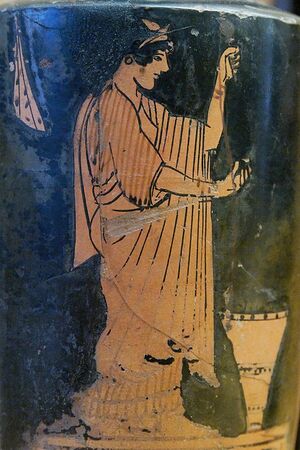Kalathos (nonfiction)
A kalathos (Ancient Greek: κάλαθος, plural kalathoi κάλαθοι) is a vase in the form of a top hat, used to hold wool or fruit, often used in ancient Greek art as a symbol of abundance and fertility.
The word kalathos means a basket, usually with a narrow base and a flared top. The decoration on some of these containers is taken to imitate the woven texture of a basket.
This can be achieved by a painted design, but many kalathoi have open-work cut into their sides and some have impressed decoration.
Kalathoi may occur with or without handles.
In both the Greek and Roman worlds these baskets had many uses, but were especially associated with wool working and the harvest.
The kalathos is principally a multifunctional basket. Literary sources report that, depending on the context, the kalathos could contain wool, but also food (bread, cheese, milk, fruits and vegetables), small animals or flowers.
In the News
Fiction cross-reference
Nonfiction cross-reference
External links:
- Kalathos @ Wikipedia
